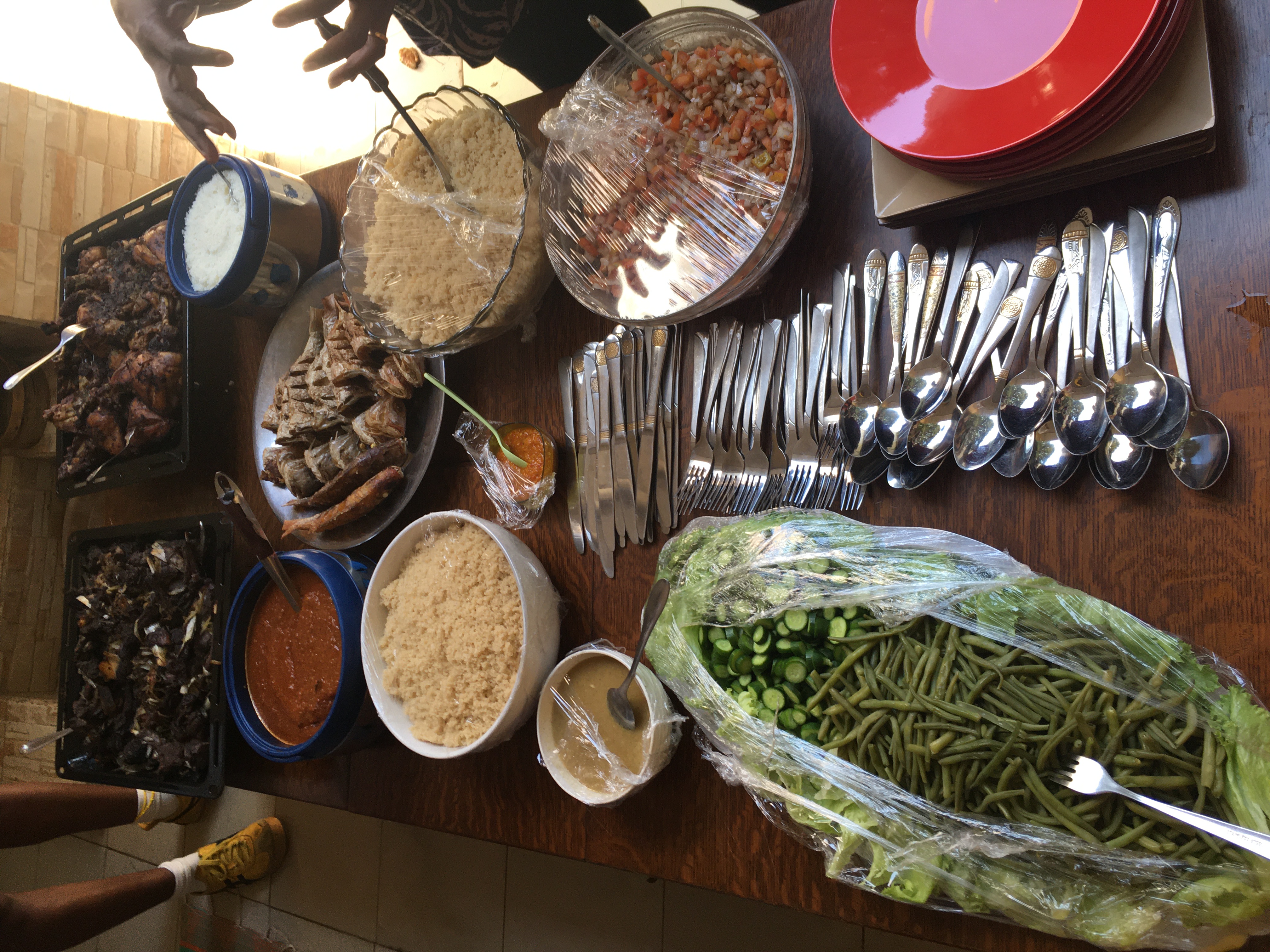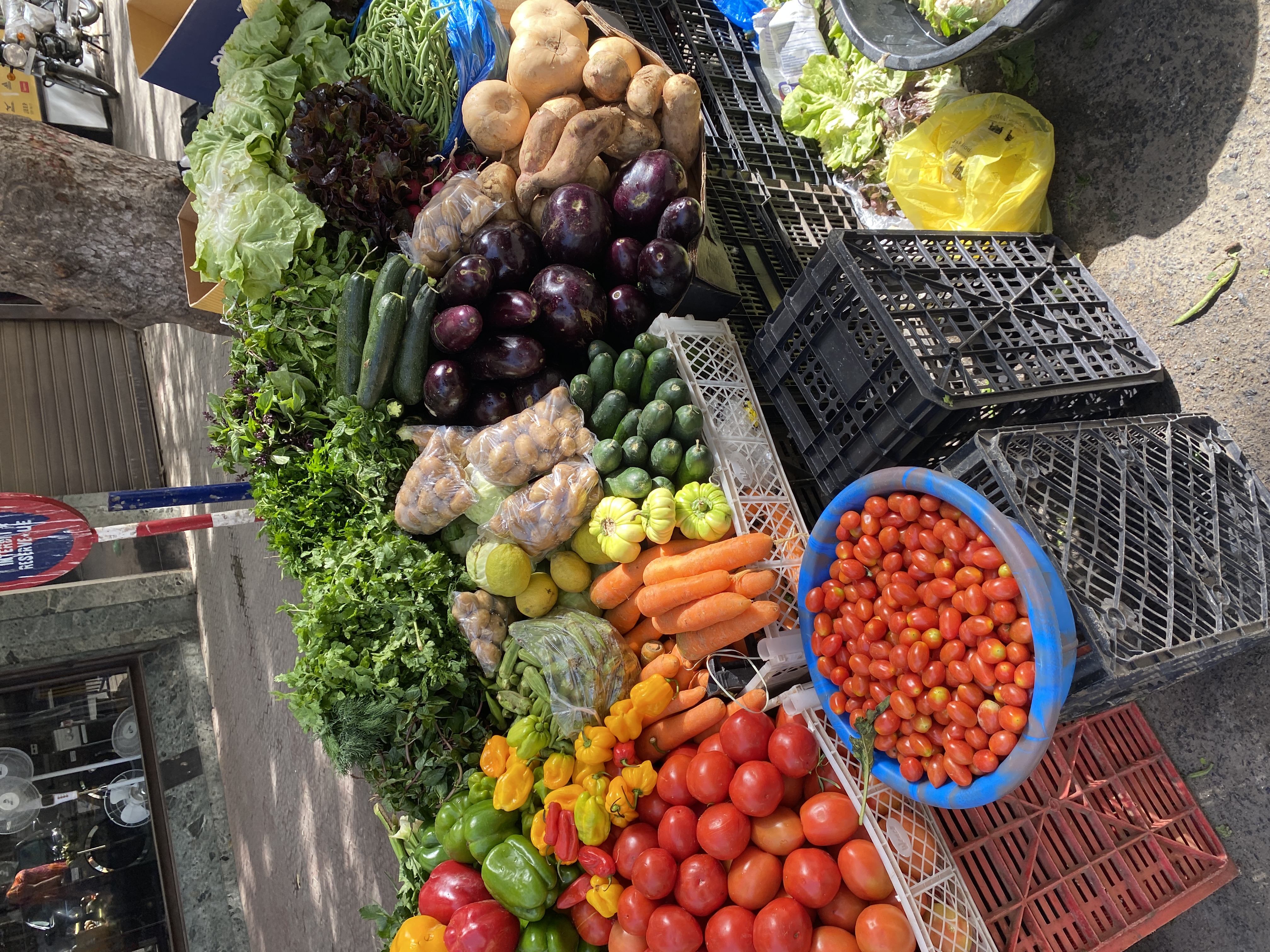Before attending Spelman College, activist and agriculture enthusiast Love Lundy, C’2024, had a limited understanding of agriculture. Her only connection to the art of gardening was through an uncle, who was known to have a ‘green thumb.’ When he died the summer before her freshman year, Lundy felt a strong, spiritual urge to learn more about the land and its ability to nurture others.
“[After his passing], I felt that I needed to be focused on agriculture,” Lundy said. “This is in my lineage. How can I honor that in my academic space?”
Lundy blended her interest in policy as a political science major with her desire to learn about food when she decided to adopt a minor in food studies. Her fields of study allow her to engage with food in a whole new way, where she has the opportunity to learn about food through the lens of policy and engage with the ways in which food can be used as a form of activism.
Spelman’s food studies minor positions food at the center of academic inquiry, calling attention to the multifaceted ways in which food influences us — as not only biological beings — but social and cultural beings as well. Students are encouraged to question the very foundation of what we consider “food” to be, challenging them to consider how food — its naming, production, distribution, and consumption — is historically contingent and simultaneously a site of pleasure and power dynamics.
One of the things that makes Spelman's food studies program unique is an emphasis on food justice - the idea that food can be an avenue to rectify historical and contemporary injustices, inequalities, and disparities, especially around issues of race, gender, and class,” said Dr. James Daria, assistant professor of anthropology and co-director of the food studies program. “In the program, students may learn in a traditional classroom, in the Victory Garden, in a chemistry lab, or in the campus Wellness Kitchen. Food studies allows interdisciplinary engagement and creative pedagogical approaches."
During her time in the program, Lundy was selected as a Food Studies Scholar, a position that allows her to further engage with food and agriculture. As a scholar, she serves as a steward of Spelman’s Victory Garden, a community garden on campus that was first cultivated in the early 1900s by some of the College’s first students.
 Lundy said that one of her favorite parts of the program is being able to feed others with the food she grows. The garden is open to anyone, and many staff and faculty members can bring home crops like collard greens and tomatoes. Harvested crops are also shared with Mimi’s Pantry, a food pantry serving Atlanta University Center students. As a result of being a Food Scholar, Lundy finds herself feeling more inclined to feed others, using food as a form of healing and community within her dorm on campus.
Lundy said that one of her favorite parts of the program is being able to feed others with the food she grows. The garden is open to anyone, and many staff and faculty members can bring home crops like collard greens and tomatoes. Harvested crops are also shared with Mimi’s Pantry, a food pantry serving Atlanta University Center students. As a result of being a Food Scholar, Lundy finds herself feeling more inclined to feed others, using food as a form of healing and community within her dorm on campus.
“Community is the essence of the program,” said Lundy. “We’re not just in some field of academia that doesn’t interact with humanity; this is humanity. This is how we function. This is how we establish culture, and maintain culture, and teach culture — through food.”
 As part of the Food Studies Scholar program, scholars take an annual trip to explore Black foodways in other countries. Just this spring, Lundy joined other Food Studies Scholars on an eight-day trip to Senegal, where the students immersed themselves in Senegalese culture and history, using food as a vehicle. The students danced, reflected and connected with the rich culinary heritage of Senegal. Like Lundy, many scholars, both past and present, find that agricultural education connects them with ancestors and live on through stories passed down through the family.
As part of the Food Studies Scholar program, scholars take an annual trip to explore Black foodways in other countries. Just this spring, Lundy joined other Food Studies Scholars on an eight-day trip to Senegal, where the students immersed themselves in Senegalese culture and history, using food as a vehicle. The students danced, reflected and connected with the rich culinary heritage of Senegal. Like Lundy, many scholars, both past and present, find that agricultural education connects them with ancestors and live on through stories passed down through the family.
Elizabeth Gowens, C’2023, a previous Food Studies Scholar, grew up hearing colorful anecdotes about her great grandmother, Granny, for most of her childhood and adolescence. Her great grandmother grew up on a ranch in Texas, tending to animals and plants and working domestically for a white family, while also feeding and nurturing her own family of eight. Granny’s agricultural and cooking knowledge was vast, as she cooked for more than 10 people each day and even learned to effectively cook for those with diabetic restrictions. But despite such extensive knowledge existing within her own family, Gowens went through most of her life with an intense interest in cooking, but a lack of understanding or knowledge related to agriculture.
When Gowens became a food studies minor, and later a Food Studies Scholar, she spent hours cultivating in the Victory Garden each week and tending to the herbs, vegetables and other crops that grew in the garden — an activity that deepened the connection she had to her great grandmother and prompted her to begin learning family recipes that had been passed down for generations.
 She’s now equipped to take on older recipes, like crackling bread, a form of cornbread with pork rinds, or her family’s renowned banana pudding. Gowens finds herself excited to pass down those recipes to her nieces and nephews, continuing the tradition and furthering the familial connection. Beyond the ancestral aspect, Gowens says it’s uniquely special to be able to grow something that feeds others.
She’s now equipped to take on older recipes, like crackling bread, a form of cornbread with pork rinds, or her family’s renowned banana pudding. Gowens finds herself excited to pass down those recipes to her nieces and nephews, continuing the tradition and furthering the familial connection. Beyond the ancestral aspect, Gowens says it’s uniquely special to be able to grow something that feeds others.
“Empty gardening beds turn to collard greens that were planted by students – it’s cool to see that and know you were the one who planted those seedlings,” said Gowens.
Post-graduation, she now works as a program assistant for the food studies program, where she assists by tending to the Victory Garden and working alongside student volunteers — a position she was in not too long ago.
Within the garden, students cultivate crops that were historically eaten by enslaved populations within the U.S., such as hibiscus, okra, collard greens, ginger, taro, fig trees and more. As part of the Introduction to African American Herbalism course that Lundy is taking this spring, she and other students are learning more about the historical connection between past Black American communities and their use of herbs for remedies and sustenance. Lundy herself has created her own mixture, a fig tea that gets its milkiness from the leaves of the herb. According to Lundy, many Food Studies Scholars have their own herbal blends for tea, a tradition within Black culture that goes back centuries.
“It’s amazing the amount of innovation we have here,” said Lundy. “I know we have the Innovation Lab here in the Science Center, but I would say the garden is an innovation lab within itself. There’s just so many incredible, creative cool ideas that have come out of us just being back there and saying, ‘what if.’”